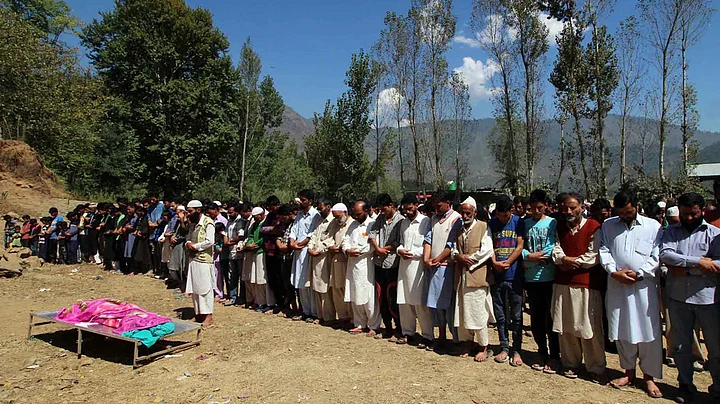When gunshots rang in Segipora village of Sopore last Friday, Mohammad Ashraf Mir, a pharmacist, mistook them for celebratory crackers fired by neighbourhood children. It was rather too early; Eid-ul-Adha was still seven days away.
But the brief cheer brought about by the thought soon faded away as he turned around to look. Barely fifty metres away, his brother-in-law, Bashir Ahmad, and three-year-old nephew Burhan Ahmad laid still on the road, covered in blood.
“I can never forget the scene; the gun was still pointed at him (Bashir), but I couldn’t see the killer. There were three of them and they were conversing in Kashmiri. One of them was caught by passers-by, but his associates helped him in escaping,” Ashraf says.
Senseless Killings in Kashmir
The murder of Burhan – one of the youngest victims of the senseless violence in Kashmir Valley – and the spate of mysterious killings of former militants and separatist activists in Sopore (a hotbed of anti-India and pro-freedom sentiment) since May this year by “unidentified gunmen” have brought the state on the brink yet again.
In the fortnight gone by, there have been more than half-dozen calls for shutdown in the state from the separatist camp.
Inspired by the #IAmAylan hashtag, commemorating the Syrian boy Aylan Kurdi, netizens from across the Valley trended #IAmBurhan on Twitter, to register their protest. But it didn’t create the impact as they would have liked.
Burhan was denied dignity even in death. No one in this country batted an eyelid. Barring the ritualistic condemnations and sympathies expressed in official statements, no one from the state’s political hierarchy approached the family, forget consoling them or sharing the pain of their loss. They have been left to their own means.
The Blame Game
Burhan was one of nearly two dozen people who were killed by “unidentified men” in Kashmir Valley this year. Just three days before the Segipora shooting, three bodies of Hizbul Mujahideen militants showed up in an orchard in Pattan locality. Earlier, a spate of killings left six people, including a senior Hurriyat activist, dead in Sopore.
Although the J&K Police blames the killings on Lashkar-e-Islam, a “breakaway faction” of the Hizb, the latter denies that the outfit even exists. Even the opposition National Conference and the separatist camp have blamed the killings in Sopore on “agencies”, hinting at a proxy war against the Hizb, which took over Lashkar-e-Taiba this year as the largest militant outfit in the state.
Union Defence Minister Manohar Parrikar’s “terrorist for terrorist” remarks have only lent credence to the talk of revival, in a new avatar, of the state-backed militia, Ikhwan, which was used in the early nineties to stamp out insurgents in the state. Home Minister Rajnath Singh, who is on a three-day-visit to the state, hasn’t even spoken a word about the ghastly events.
A Family in Ruins
The deepening mystery of “unidentified gunmen” has anguished not only the former militants who want to lead normal lives, but also terrified the ordinary people who are caught in the crossfire. While the killers roam freely, the murder of Burhan and his father, Bashir, a former militant, comes as a sad reminder that nothing has changed in Kashmir, not even for those who prefer peace over violence.
Over the last five days, villagers drop in at the residence of Bashir, who is survived by a widow and a year-old daughter, in twos and threes, and console her. Ashraf speaks to them with regret, shedding a tear or two while recalling the day he gifted a plot of land to his brother-in-law and sister for building their own home, which may be never finished now.
“We wanted Burhan to become a doctor. Bashir had shunned the path of violence. His two brothers were killed earlier in encounters. He wanted to lead a normal life. But what did he gain out of it? He was killed anyway. And we may never truly know who killed him,” Ashraf says.
(At The Quint, we question everything. Play an active role in shaping our journalism by becoming a member today.)
